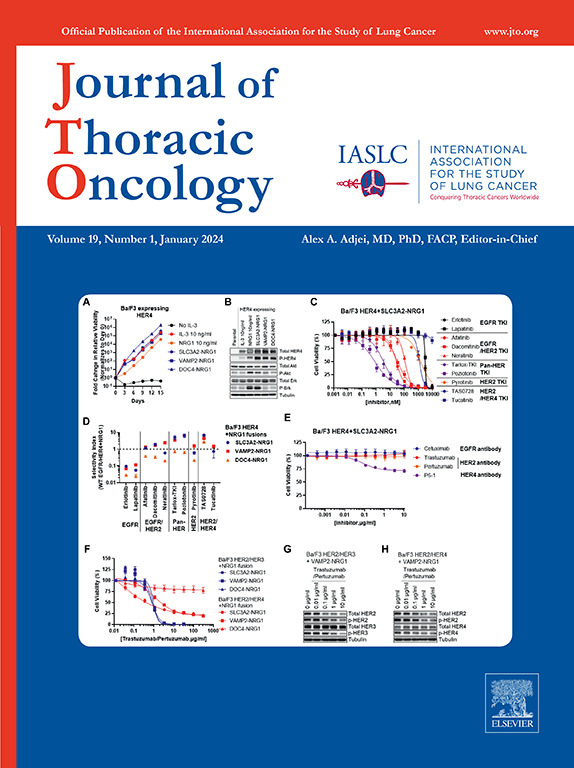Polygenic Risk Score and Lung Adenocarcinoma Risk Among Never-Smokers by EGFR Mutation Status: A Brief Report
IF 21
1区 医学
Q1 ONCOLOGY
引用次数: 0
Abstract
We assessed the association between a genome-wide polygenic risk score (PRS) developed for lung adenocarcinoma (LUAD) risk and mutation on the EGFR gene in 998 East Asian never-smoking female LUAD cases (518 EGFR-positive; 480 EGFR-negative) and 4544 never-smoking controls using case-case and multinomial regression analyses. We found that the PRS was more strongly associated with EGFR-positive LUAD compared with EGFR-negative LUAD, where the association between the fourth quartile of the PRS and EGFR-positive LUAD (odds ratio = 8.63, 95% confidence interval: 5.67–13.14) was significantly higher than the association between the fourth quartile of the PRS with EGFR-negative LUAD (odds ratio = 3.50, 95% confidence interval: 2.44–5.00) (p-heterogeneity = 3.66 × 10−3). Our findings suggest that germline genetic susceptibility may be differentially associated with LUAD in never-smoking female East Asian patients depending on the cancer's mutation status, which may have important public health and clinical implications.
表皮生长因子受体突变状态与从不吸烟者的多基因风险评分和肺腺癌风险--简要报告。
我们使用病例和多项式回归分析法评估了998例东亚从不吸烟的女性肺腺癌(LUAD)病例(518例表皮生长因子受体(EGFR)阳性;480例表皮生长因子受体(EGFR)阴性)和4544例从不吸烟的对照组中为肺腺癌(LUAD)风险开发的全基因组多基因风险评分(PRS)与表皮生长因子受体(EGFR)基因突变之间的关联。我们发现,与表皮生长因子受体阴性 LUAD 相比,PRS 与表皮生长因子受体阳性 LUAD 的相关性更强,其中 PRS 第四四分位数与表皮生长因子受体阳性 LUAD 的相关性(OR=8.63,95% CI:5.67,13.14)显著高于 PRS 第四四分位数与表皮生长因子受体阴性 LUAD 的相关性(OR=3.50,95% CI:2.44,5.00)(p-异质性=3.66x10-3)。我们的研究结果表明,在从不吸烟的东亚女性患者中,种系遗传易感性可能因癌症突变状态的不同而与LUAD有不同的关联,这可能具有重要的公共卫生和临床意义。
本文章由计算机程序翻译,如有差异,请以英文原文为准。
求助全文
约1分钟内获得全文
求助全文
来源期刊

Journal of Thoracic Oncology
医学-呼吸系统
CiteScore
36.00
自引率
3.90%
发文量
1406
审稿时长
13 days
期刊介绍:
Journal of Thoracic Oncology (JTO), the official journal of the International Association for the Study of Lung Cancer,is the primary educational and informational publication for topics relevant to the prevention, detection, diagnosis, and treatment of all thoracic malignancies.The readship includes epidemiologists, medical oncologists, radiation oncologists, thoracic surgeons, pulmonologists, radiologists, pathologists, nuclear medicine physicians, and research scientists with a special interest in thoracic oncology.
 求助内容:
求助内容: 应助结果提醒方式:
应助结果提醒方式:


